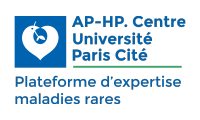The clinical services of the Necker-Enfants malades AP-HP hospital, in close collaboration with teams from the AP-HP, Inserm and Université Paris Cité, within the Imagine Institute, have identified 51 biomarkers that could predict the success of gene therapy in patients suffering from chronic septic granulomatosis, a rare and serious disease of the immune system. The results of this study, conducted as part of a clinical trial promoted by Genethon, were published on January 26, 2023 in Cell Report Medicine.
Chronic septic granulomatosis is a genetic disease caused by a mutation of the CYBB gene located on the X chromosome, and therefore affecting only boys. It causes a dysfunction of a protein subunit that prevents « neutrophils » – a class of white blood cells that constitute the first line of defense against bacterial infections – from producing the molecules necessary to destroy infectious agents.
As a result, patients with this disease suffer from recurrent bacterial and fungal infections that can be life-threatening in the short term.
Four boys with chronic septic granulomatosis were included in this study.
The gene therapy clinical trial consisted of taking blood stem cells from patients, genetically correcting them via lentiviral vectors, and then reinjecting them.
Two of the four children showed an effective response to this treatment.
To explain the mixed results of this clinical trial, the researchers conducted extensive real-time studies on the genetically corrected cells of the treated patients.
They first noticed more chronic inflammation in the two patients who did not respond to the treatment.
« Chronic inflammation has a drastic impact on the stem cells of these patients. It changes the biological characteristics of these cells, which are no longer able to function normally once reinjected into the patients, » explains Steicy Sobrino, co-first author of the publication with Alessandra Magnani.
They then used the so-called « Single Cell » technology to perform a cell-by-cell transcriptomic analysis (RNA analysis) and an automatic annotation of the cells using the Cell-ID method developed by the clinical bioinformatics laboratory, directed by Antonio Rausell.
In total, 400 stem cells were analyzed (100 per patient).
« Thanks to statistical learning techniques, we were able to identify 51 specific biomarkers of inflammation in the two patients for whom the transplant was not effective, » explains Emmanuelle Six, Inserm research fellow in the human lymphohematopoiesis laboratory at the Imagine Institute, and coauthor of the article, Alongside Antonio Rausell, Pr Marina Cavazzana, a pediatrician and director of the biotherapy department at the Necker-Enfants malades AP-HP hospital, Pr Stéphane Blanche, head of the pediatric immuno-hematology and rheumatology department at the Necker-Enfants malades AP-HP hospital until 2021 and principal investigator of the study, and Anne Galy, Inserm research director at Genethon.
By combining the skills of several basic and clinical research teams from the Necker-Enfants malades/Institut Imagine campus, Pr Marina Cavazzana, the project coordinator, hopes to have found a method for predicting which patients will be « resistant » to gene therapy at a given point in their clinical history, and thus prevent failures. Her goal is to propose anti-inflammatory treatments, upstream of the gene therapy, in order to increase the success rate. This discovery has important implications for many other genetic diseases currently under investigation.
This clinical study was sponsored by Genethon, and is the result of more than ten years of research by Genethon teams, led by Dr Anne Galy in the framework of the european project Net4CGD in collaboration with GOSH teams led by Pr Adrian J. Thrasher in London, and the clinical investigation center for biotherapy (CIC-BT) at the Imagine Institute led by Pr Marina Cavazzana. It is the result of joint and multidisciplinary efforts of several teams from the Necker-Enfants malades/Imagine institute campus including the pediatric immuno-hematology and rheumatology departments, infectiology, the mother-child clinical investigation center and several research laboratories.
Reference : Steicy Sobrino; Alessandra Magnani; Michaela Semeraro; Loredana Martignetti; Akira Cortal; Adeline Denis; Chloé Couzin; Capucine Picard; Jacinta Bustamante; Elisa Magrin; Laure Joseph; Cécile Roudaut; Aurélie Gabrion; Tayebeh Soheili; Corinne Cordier; Olivier Lortholary; François Lefrere; Frédéric Rieux-Laucat; Jean-Laurent Casanova; Sylvain Bodard; Nathalie Boddaert; Adrian J. Thrasher; Fabien Touzot; Sophie Taque; Felipe Suarez; Ambroise Marcais; Agathe Guilloux; Chantal Lagresle-Peyrou; Anne Galy; Antonio Rausell; Stephane Blanche; Marina Cavazzana; Emmanuelle Six Cell Report Medicine.
Source : AP-HP


